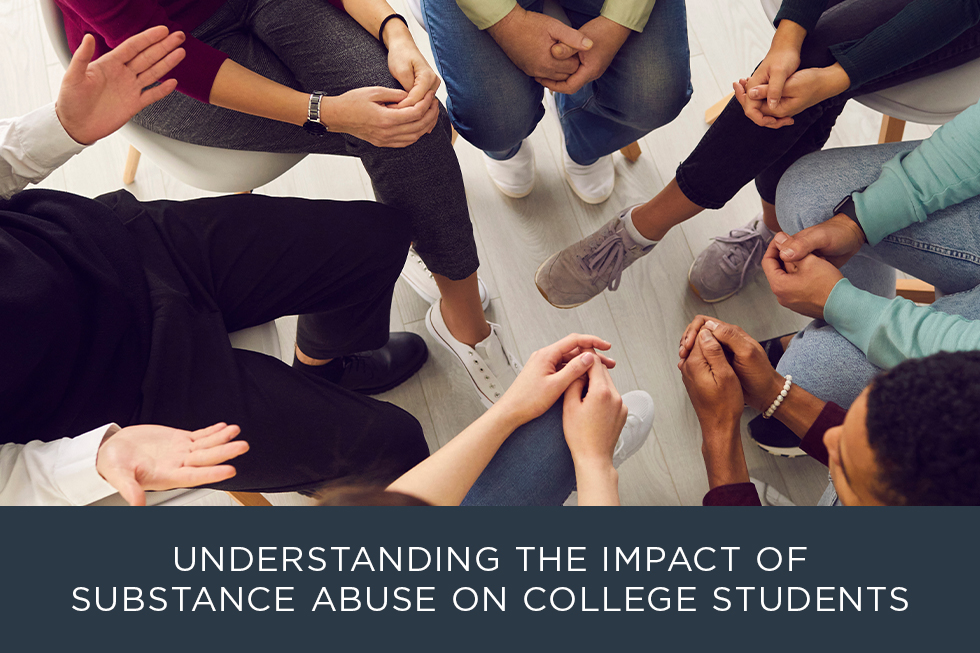Substance abuse among college students is a significant concern, affecting academic performance, mental health, and future career opportunities. College life brings newfound freedom, social pressures, and educational challenges, all of which can contribute to experimenting with or regularly using substances such as alcohol, marijuana, prescription medications, and illicit drugs.
Understanding the impact of substance abuse on college students is crucial for students, educators, and parents alike. By recognizing the risks and consequences, institutions can develop effective prevention strategies, and students can make informed decisions regarding their health and future.
The Effects of Substance Abuse on Academic Performance
Substance use has been linked to academic challenges, such as difficulty concentrating and maintaining performance.
How Substance Use Affects Learning and Grades
Regular use of alcohol and drugs can lead to cognitive impairments, making it difficult for students to concentrate, retain information, and perform well in exams. Some key academic consequences include:
- Lower GPA and Academic Probation: Students who frequently engage in substance use often struggle to maintain high grades, potentially leading to academic probation or even expulsion.
- Missed Classes and Assignments: Frequent partying or substance use can result in absenteeism, late assignments, and incomplete coursework.
- Reduced Cognitive Function: Drugs and alcohol can impair memory, decision-making skills, and focus, directly affecting a student’s ability to learn effectively.
The Mental and Physical Health Consequences of Substance Abuse
Substance abuse doesn’t just affect grades—it also has severe mental and physical health repercussions. College students already face mental health challenges such as anxiety and depression, which can be exacerbated by substance abuse. Common issues include:
- Increased Anxiety and Depression: Regular substance use can alter brain chemistry, leading to heightened symptoms of anxiety and depression.
- Addiction Risks: What starts as casual use can develop into dependency, making it harder to function without substances.
- Poor Coping Mechanisms: Many students use substances as a way to handle stress, which can lead to long-term, unhealthy coping strategies.
Physical Health Risks
The physical effects of substance abuse include:
- Weakened Immune System: Frequent drug and alcohol use can lower the body’s ability to fight infections and illnesses.
- Increased risk of certain cancers
- Skin and hair problems
- Infertility or erectile dysfunction
- Vision and oral problems
- Unhealthy weight loss or weight gain
- Sleep Disruptions: Irregular sleep patterns caused by substance use can lead to chronic fatigue and reduced cognitive function.
- Risk of Accidents and Injuries: Impaired judgment and coordination increase the likelihood of accidents, falls, and other injuries.
Recognizing these risks can encourage students to make healthier lifestyle choices and seek help if needed.
Social and Legal Consequences of Substance Abuse
Substance abuse can have far-reaching consequences beyond personal health and academics.
The Impact on Social Relationships
Excessive substance use can strain relationships with family, friends, and professors. Common issues include:
– Isolation: Students who develop substance dependencies may withdraw from social activities and academic responsibilities.
– Conflicts with Peers: Erratic behavior or excessive partying can lead to misunderstandings and broken friendships.
– Damage to Reputation: Actions taken under the influence can harm a student’s reputation, affecting future opportunities.
Legal and Disciplinary Actions
Many colleges have strict policies regarding substance use, and violations can lead to:
- Campus Disciplinary Actions: Suspension or expulsion can result from drug-related offenses.
- Legal Consequences: Underage drinking, DUI charges, and possession of illegal substances can result in legal trouble and criminal records.
- Loss of Scholarships: Many institutions revoke financial aid for students caught violating substance policies.
Understanding these risks can help students make responsible choices and avoid consequences that could affect their future. Please view your student catalog for more information.
Strategies for Prevention and Support
Taking proactive steps can help students manage stress without resorting to substance use.
Healthy Alternatives to Substance Use
Encouraging healthier ways to cope with stress and social pressures can reduce the likelihood of substance abuse:
- Engage in Campus Activities: Joining clubs and sports teams can provide a positive and supportive environment.
- Utilize Counseling Services: Most colleges offer mental health resources, including counseling and therapy.
- Practice Mindfulness and Stress Management: Techniques such as yoga, meditation, and exercise can help reduce stress naturally.
Support for Students Struggling with Substance Use
For students who may already be experiencing substance-related issues, there are several options:
- On-Campus Support Groups: Many colleges offer peer support and recovery groups.
- Academic Assistance: Seeking tutoring and time management workshops can help students regain academic standing without resorting to substance use.
- Professional Treatment Services: When necessary, students can seek help from healthcare professionals specializing in addiction treatment.
The Role of Education in Preventing Substance Abuse
Education plays a critical role in prevention, helping students make informed decisions about substance use.
MedQuest College’s Commitment to Student Well-Being
MedQuest College offers information regarding counseling, treatment, rehabilitation, or re-entry programs for those who need assistance. Those seeking help should please speak with any staff or faculty member.
For those seeking self-help, Narcotics.com offers an extensive and up-to-date directory of Narcotics Anonymous meetings across Kentucky.
Another alternative is SMART Recovery, Self Management and Recovery Training, which is an evidence-informed recovery method grounded in Rational Emotive Behavioral Therapy (REBT) and Cognitive Behavioral Therapy (CBT), that supports people with substance dependencies or problem behaviors to:
- Build and maintain motivation
- Cope with urges and cravings
- Manage thoughts, feelings, and behaviors
- Live a balanced life
Meetings can be via Zoom or in person, free of charge.
Making Informed Choices for a Healthier Future
Understanding the impact of substance abuse on college students is essential for making responsible choices that support academic success, mental well-being, and long-term career goals. By recognizing the risks and exploring healthy alternatives, students can take control of their college experience positively.
If you or a loved one is struggling with substance use or addiction, contact the Substance Abuse and Mental Health Services Administration (SAMHSA) National Helpline at 1-800-662-4357 for information on support and treatment facilities in your area.

